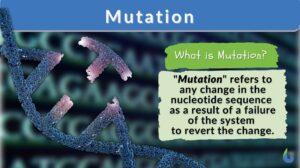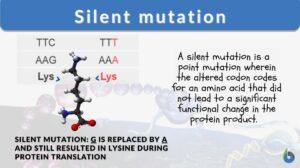Search Results for: ph scale
Large-scale mutation
Definition noun, plural: large-scale mutations (genetics) A type of mutation several nucleotides of a gene within a large... Read More
Deletion mutation
Definition noun, plural: deletion mutations (genetics) A type of mutation wherein one or few nucleotide base pairs are... Read More
Small-scale mutation
Definition noun, plural: small-scale mutations (genetics) A type of mutation characterized by a change of one or few... Read More
Ecosystem diversity
Ecosystem Diversity Definition What is ecosystem diversity? Ecosystem diversity deals with the study of different... Read More
Hydrophilic
Hydrophilic Definition What does a hydrophile (or hydrophilic molecule) mean? If a molecule is “water-loving”, it is... Read More
Nucleotide deletion
Definition noun A deletion of a single nucleotide causing a shift in the reading frame of the codons in the mRNA, thus, may... Read More
Insertion (genetics)
In genetics, insertion refers to the type of mutation characterized by the insertion of one or few nucleotide base pairs to... Read More
Transition
Definition noun, plural: transitions (genetics) A small-scale mutation characterized by the replacement of a purine by... Read More
Transversion
Definition noun, plural: transversions (genetics) A small-scale mutation characterized by the replacement of a purine by... Read More
Point mutation
Definition noun, plural: point mutations (genetics) A small-scale mutation characterized by a change of only one nucleotide... Read More
Substitution mutation
Definition noun, plural: substitution mutations (genetics) A small-scale mutation characterized by a substitution of one or... Read More
Udden-wentworth scale
Udden-Wentworth scale (Science: plant biology) A geometric scale of grain sizes which classifies particles of siliciclastic... Read More
Convoluted
The word convoluted is often used to describe different things, especially structures or components, that have overlapped.... Read More
Genetic variability
Genetic Variability Definition Genetic variability refers to the tendency of individual genetic characteristics in a... Read More
Primary succession
Primary Succession Definition Primary succession is an ecological succession where a newly formed area is inhabited for the... Read More
Chromosomal inversion
Definition noun, plural: chromosomal inversions A chromosomal aberration wherein a segment of a chromosome is reversed... Read More
Primary productivity
Planet Earth is home to different types of life forms ranging from microscopic bacteria to giant whales and elephants. To... Read More
Equilibrium
Equilibrium Definition In Biology Equilibrium refers to the state of balance and stability. In biology, equilibrium is... Read More
Graduation
Graduation 1. The act of graduating, or the state of being graduated; as, graduation of a scale; graduation at a college;... Read More
Atomic mass
Atomic mass (Science: chemistry, physics) The mass of an atom relative to other atoms. The present-day basis of the scale of... Read More
New Zealand’s Unique Fauna
By: Maria Victoria GonzagaIn the previous lesson, we learned about the high biodiversity of New Zealand and how... Read More
Inheritance and Probability
Reviewed by: Mary Anne Clark, Ph.D.Gregor Mendel, an Austrian monk, is most famous in this field for his study... Read More
Micrometer
micrometer An instrument, used with a telescope or microscope, for measuring minute distances, or the apparent diameters of... Read More
Silent mutation
A mutation is a change in the nucleotide sequence of a gene or a chromosome. When there is only one nucleotide involved, it... Read More
Amphibians & Early Reptiles
Amphibia Definition (Science: zoology) Amphibia is one of the classes of vertebrates.The amphibia are distinguished by... Read More
Chemical Composition of the Body
In order to fully understand the mechanisms of human physiology, it is important to have an understanding of the chemical... Read More
Biotic potential
When we look at the different forms of life, we often wonder how they have continued to exist one generation after another.... Read More
Environment
Environment Definition What does environment mean? If you mean physical environment, then it is defined as the surrounding... Read More
Vascular Plants: Ferns and Relatives
These plants are seedless plants, but unlike the bryophytes, they do have vascular tissue (xylem and phloem). Because of the... Read More




















